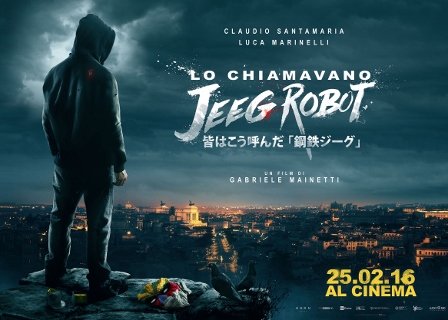
 Umberto Mucci
Umberto Mucci
Italian cinema: Italy's superhero, Lo chiamavano Jeeg Robot
- WTI Magazine #78 Apr 15, 2016
-

 Umberto Mucci
Umberto Mucci
WTI Magazine #78 2016 April 15
Author : Edoardo Peretti Translation by:
Over the past two decades one of the most often accusations addressed to Italian cinema was that of being provincial, self-referential and not exportable abroad; among other causes, there was also the right criticism that ours was a little diverse cinema, almost never addressing "genres" different from the usual comedy. In recent years this trend is changing: a new generation of writers and directors is growing, more attentive to the genera, also with the goal of exporting our cinema.
The most important example is having a big success in these weeks. "Lo chiamavano Jeeg Robot" (They used to call him Jeeg Robot), first feature film by Gabriele Mainetti. The movie, released in theaters about a month ago, has had a very big success both from the public and critics, as evidenced by the 16 nominations for the David di Donatello Awards, the "Oscars" of Italian cinema.
"Lo chiamavano Jeeg Robot" (Jeeg Robot was a Japanese cartoon broadcasted in Italy back in the 70s) is a superhero movie, which harks back to the typical pattern of overseas films - in particular the ones of Marvel - but managing to be, at the same time, typically Italian. Or rather, typically Roman, as the story, tells about a typical boy (played by Claudio Santamaria) from a typical Roman neighborhood who, evading police, falls into a container of radioactive material buried in the Tiber river, gaining superpowers. Realizing his new reality, initially he uses it for his own purposes: for example, in one of the most famous sequences, he eradicate an ATM from a wall and takes it home.
In the meantime, however, Rome is plagued by a series of bombs and a petty criminal with delusions of greatness, even a bit crazy: the "Gypsy", starring a terrific Luca Marinelli, who thus confirms being maybe the most promising and talented actor of his generation. The Gypsy discovers the secret of Jeeg and he too becomes a dangerous criminal with superpowers and superhuman strength: the final battle is inevitable, and takes place in occasion of the Derby (the soccer match between the two Roman rival teams).
Beyond elements that operate less than others, such as the love story and a certain rhetoric in telling it, the Mainetti film works: it is smart and fun without pretending to be socially or morally deeply involved, it engages as the best American products of genre and manages to be absolutely a "cult". As the American products, it refers to pop culture, exemplified by the references to the Japanese cartoon, even managing from this point of view to be perfectly Italian: think about the scene in which the Gypsy sings Anna Oxa and Loredana Bertè (two popular contemporary Italian singers), another example of the "pop" element.
Even the promise of a sequel is inspired by the model of the Marvel Universe, as well as the cross-media that produced a comic inspired by the movie. The relationship with the comic is another interesting item to note, especially in years when the production of Italian graphic novels is growing and settling down in our cultural landscape, dialoguing, in a kind of mutual influence, with the seventh art. One for all: Zerocalcare, an Italian cartoonist whose novels are full of pop and characterized by a melancholic and mocking generational analysis, with more of a kinship with this movie.
In short, "Lo chiamavano Jeeg Robot" can be considered the true first film of Italian superheroes, although very few examples produced between the 70s and the 80s and despite Gabriele Salvatores' "Il ragazzo invisibile": in contrast to the more free-range and genuine Mainetti movie, Salvatores made a film more tied to certain coordinates of our cinema, like a sometimes excessive sentimentality and a certain intellectual detachment that did not allowed him to go to the bottom of the typical characteristics of the genre.
"Lo chiamavano Jeeg Robot fits well in the list of the Italian works that, in recent years, have tried to stir up a bit the stagnant situation of our cinema and our industry: another example is another "Roman" movie, the apocalyptical, dark and nihilistic gangster movie "Suburra" by Stefano Sollima. We'll see if the David di Donatello jury will recognize the importance, at least from this point of view, of Mainetti's work. The film, however, already received the prize of the critics and the public of the Italian Cinema Festival in Lisbon.